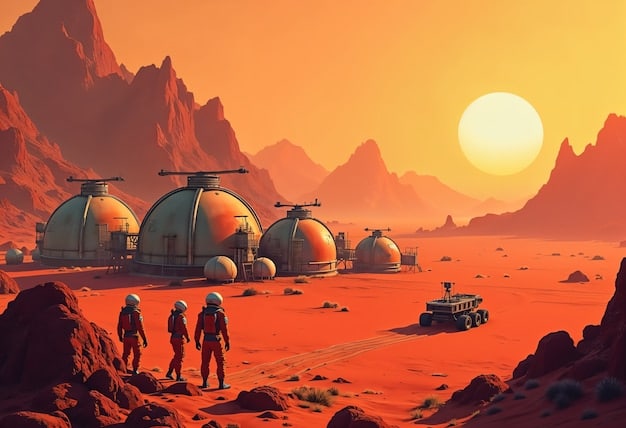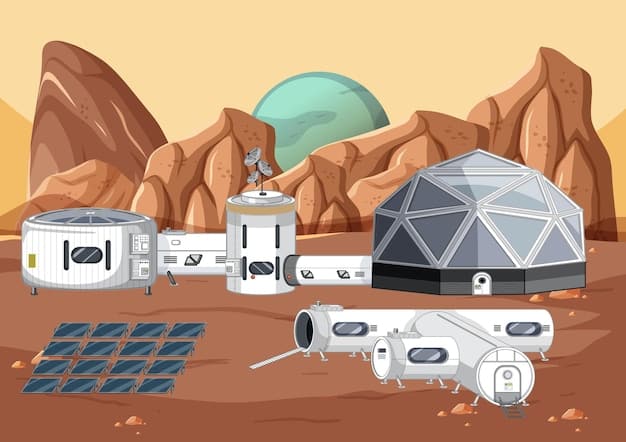Ethical Colonization of Mars: US Policy in 2025

What are the ethical considerations surrounding the potential colonization of Mars, and how are US policymakers addressing them in 2025? These considerations involve planetary protection, resource allocation, and the potential impact on Martian environments, which US policymakers are beginning to address through nascent regulatory frameworks and international collaborations.
The prospect of colonizing Mars ignites the imagination, but it also raises profound ethical questions. What are the ethical considerations surrounding the potential colonization of Mars, and how are US policymakers addressing them in 2025? This article delves into these critical issues, exploring the moral dilemmas and policy responses surrounding humanity’s potential expansion to the Red Planet.
As we stand on the cusp of interplanetary settlement, understanding these considerations is paramount. Let’s examine how we can ensure a just and responsible approach to Martian colonization.
Ethical Foundations of Martian Colonization
The colonization of Mars is no longer a science fiction fantasy but a tangible possibility. As we embark on this ambitious endeavor, it is essential to consider the ethical foundations that should guide our actions. This exploration will ensure that the colonization process respects both human values and the potential for life on Mars.
Planetary Protection
One of the foremost ethical concerns is planetary protection – the need to prevent contamination of Mars by terrestrial organisms. This includes both forward contamination (introducing Earth-based life to Mars) and backward contamination (bringing Martian life, if it exists, back to Earth).
- Maintaining Scientific Integrity: Preserving Mars in its pristine state allows for unbiased scientific exploration.
- Preventing Ecological Harm: Introducing Earth-based microbes could disrupt or destroy any native Martian ecosystems.
- Ensuring Public Safety: Addressing concerns about backward contamination to avoid any potential health risks on Earth.
These measures are critical for preserving the scientific integrity of Mars and ensuring the safety of both planets.

In conclusion, the ethical foundations of Martian colonization must include robust measures for planetary protection. This approach ensures that we proceed responsibly and respectfully, safeguarding the scientific and ecological integrity of both Earth and Mars. The question of what are the ethical considerations surrounding the potential colonization of Mars, and how are US policymakers addressing them in 2025, will therefore need constant review based on evolving scientific insight.
Resource Utilization and Sustainability
Colonizing Mars will require significant resources, both from Earth and those available on the Red Planet. Ethical considerations arise in how these resources are utilized and whether the colonization efforts are sustainable in the long term. Thoughtful planning and responsible practices are essential to ensure the success and ethical viability of the colonization project.
In-Situ Resource Utilization (ISRU)
ISRU involves using Martian resources, such as water ice and regolith (Martian soil), to produce essentials like water, oxygen, and building materials. This approach reduces the need to transport resources from Earth, making colonization more feasible.
What are the ethical considerations surrounding the potential colonization of Mars? They include the sustainability of resource extraction and its impact on the Martian environment.
Sustainable Practices
Developing sustainable practices is vital for long-term Martian colonization. This includes:
- Closed-Loop Systems: Creating systems that recycle resources like water and air to minimize waste.
- Renewable Energy: Utilizing solar, wind, or other renewable energy sources available on Mars.
- Waste Management: Implementing effective waste management strategies to prevent pollution.
These practices not only ensure sustainability but also minimize our ecological footprint on Mars.

Ultimately, ethical resource utilization and sustainable practices are critical for the long-term success of Martian colonization. By prioritizing responsible resource management and sustainable technologies, we can ensure that our presence on Mars is both beneficial and environmentally sound.
The Impact on Potential Martian Life
A crucial ethical consideration is the possibility of extant Martian life, even if it is microbial. Colonization efforts must proceed in a way that minimizes harm to any potential Martian organisms. Understanding and protecting any indigenous life forms should be a guiding principle.
The discovery of evidence of past or present Martian life would dramatically alter the ethical landscape of colonization.
Protecting Martian Ecosystems
The approach to protecting Martian ecosystems involves several critical steps:
- Thorough Scientific Investigation: Conducting extensive research to determine if life exists on Mars before large-scale colonization begins.
- Establishing Protected Zones: Creating areas where human activity is restricted to preserve potential habitats.
- Implementing Strict Biosecurity Measures: Ensuring that all equipment and personnel are thoroughly sterilized to prevent contamination.
Ethical Frameworks
Developing ethical frameworks to guide colonization efforts is essential. These frameworks should be based on principles of:
- Respect: Acknowledging the intrinsic value of any Martian life.
- Caution: Proceeding with prudence to avoid unintended harm.
- Transparency: Ensuring that all activities are open and subject to ethical review and what are the ethical considerations surrounding the potential colonization of Mars?
By adhering to these frameworks, we can navigate the ethical complexities of exploring and potentially inhabiting a planet with the possibility of native life.
Social and Political Considerations for US Policymakers
The colonization of Mars is not only a scientific and technological endeavor but also a deeply social and political one. US policymakers will need to address numerous ethical questions related to the governance, community development, and human rights of Martian settlements. These considerations are critical to ensuring a just and equitable future on the Red Planet.
Governance and Law
Establishing a system of governance and law on Mars will present unique challenges. Traditional legal frameworks may not be directly applicable, and new approaches may be needed. Key considerations include:
- Jurisdiction: Determining which laws apply on Mars and who has the authority to enforce them.
- Representation: Ensuring that Martian colonists have a voice in their governance.
- Conflict Resolution: Establishing mechanisms for resolving disputes and maintaining order.
US policymakers need to consider these factors to create a stable and fair legal environment on Mars.
Community Development
Building a sustainable and thriving community on Mars requires addressing various social needs:
- Healthcare: Providing access to medical care in a remote and challenging environment.
- Education: Establishing educational systems to support the intellectual growth of the colonists.
- Social Support: Creating community structures to foster social connections and address mental health needs.
Human Rights
Ensuring the protection of human rights on Mars is paramount. Colonists should have the same fundamental rights and freedoms as people on Earth, including:
- Freedom of Expression: The right to express their opinions and ideas without fear of reprisal.
- Due Process: The right to fair and just legal proceedings.
- Equality: Ensuring that all colonists are treated equally, regardless of their background or status.
These rights must be enshrined in the legal and social fabric of Martian society.
The involvement of US policymakers in addressing ethical dimensions ensures that the colonization of Mars aligns with American values of justice, equality, and human rights. This comprehensive planning is crucial for creating a thriving and ethical Martian society.
International Cooperation and Agreements
The colonization of Mars is an endeavor that transcends national boundaries. International cooperation and agreements are essential to ensure that the colonization process is conducted ethically and in the best interests of all humanity. Collaboration among nations can lead to shared resources, knowledge, and a unified approach to the challenges of Martian settlement and demonstrate what are the ethical considerations surrounding the potential colonization of Mars.
Shared Resources
Pooling resources from multiple countries can significantly reduce the financial and logistical burdens of Martian colonization. This includes:
- Funding: Sharing the costs of research, development, and missions to Mars.
- Technology: Collaborating on the development of essential technologies, such as life support systems and propulsion methods.
- Expertise: Combining the knowledge and skills of scientists, engineers, and other specialists from around the world.
Agreements
Establishing international agreements can help prevent conflicts and promote cooperation on Mars. These agreements could cover:
- Resource Management: Rules for the sustainable and equitable use of Martian resources.
- Environmental Protection: Measures to protect the Martian environment and prevent contamination.
- Conflict Resolution: Mechanisms for resolving disputes among colonists from different nations.
By addressing these factors through international agreements, we can foster a sense of shared purpose.
Addressing Potential Risks and Uncertainties
The colonization of Mars is fraught with potential risks and uncertainties. Ethical considerations require us to address these challenges proactively, ensuring that we minimize harm and maximize the chances of success. Understanding and preparing for potential risks is crucial for responsible colonization efforts.
What are the ethical considerations surrounding the potential colonization of Mars when potential risks exist?
Risks Associated
The risks can be associated with:
- Environmental Risks: Dealing with the harsh Martian environment, including radiation, extreme temperatures, and dust storms.
- Technological Risks: Addressing potential failures of critical life support systems or other technologies.
- Human Health Risks: Managing the physical and psychological challenges of long-duration spaceflight and living in a confined environment.
Mitigation Strategies
Developing robust mitigation strategies is essential. This includes:
- Redundancy: Building multiple backup systems to ensure that critical functions can continue even if one system fails.
- Emergency Protocols: Establishing clear procedures for responding to emergencies, such as habitat leaks or medical crises.
- Mental Health Support: Providing access to mental health care to help colonists cope with the stresses of living on Mars.
| Key Aspect | Brief Description |
|---|---|
| 🌍 Planetary Protection | Preventing contamination of Mars and Earth. |
| ⛏️ Resource Utilization | Using Martian resources sustainably. |
| ⚖️ Ethical Governance | Ensuring justice and human rights on Mars. |
| 🤝 International Cooperation | Agreements for shared resources and knowledge. |
Frequently Asked Questions
Stringent sterilization protocols are in place for all equipment sent to Mars. Scientists also establish protected zones to minimize human impact on potential habitats.
In-situ resource utilization (ISRU) is vital, using Martian resources like water ice to produce essentials. Closed-loop systems recycle resources, and renewable energy sources are utilized.
Establishing fair laws, ensuring representation for colonists, and creating conflict resolution mechanisms are key ethical considerations for governance on Mars.
International cooperation can pool resources, share knowledge, and foster a unified approach. Agreements could regulate resource management, environmental protection and reduce the risks of missteps.
Redundancy in critical systems, emergency protocols, and mental health support are crucial strategies to reduce risks and ensure the well-being of Martian colonists.
Conclusion
Addressing what are the ethical considerations surrounding the potential colonization of Mars, and how are US policymakers addressing them in 2025 requires a multifaceted approach, encompassing international cooperation, resource management, and a commitment to human rights. While challenges remain, a proactive and inclusive approach is vital for ensuring a responsible and sustainable Martian society.
By addressing these ethical challenges, we can pave the way for a future where humanity’s expansion to Mars is conducted with integrity and respect for both human and planetary well-being. As we continue to explore the possibility of Martian colonization, these ethical considerations must remain at the forefront of our discussions and decisions.





